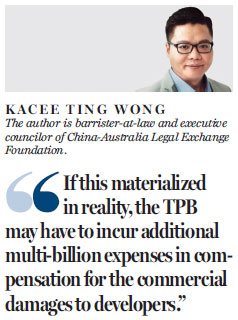Balancing private property rights with town planning
Updated: 2016-10-11 07:33
By Kacee Ting Wong(HK Edition)
|
|||||||||
On Sept 26, the Court of Final Appeal ruled that the Town Planning Board (TPB) must consider private property rights before imposing any land use restrictions. Furthermore, the top court held that Articles 6 and 105 of the Basic Law confer constitutional protection on the private property rights of property owners and developers.
The ruling was handed down after Hong Kong property developer Hysan Development - which owns properties at various sites in Causeway Bay and Wan Chai - had challenged planning restrictions on podium height limits and construction limits in designated areas.
The result will trigger a significant change in Hong Kong's town planning mechanism as the TPB is responsible for guiding and controlling the development and use of land to promote the health, safety, convenience and the general welfare of the community.
By virtue of the Town Planning Regulations, the TPB is responsible for formulating, monitoring and reviewing town plans, planning policies and associated programs for the physical development of Hong Kong at the territorial and district/local levels.

The Basic Law Article 6 stipulates that the HKSAR should protect the right of private ownership of property in accordance with law. Further, Article 105 protects the right of individuals to the "acquisition, use, disposal and inheritance of property" and to their right to compensation for lawful deprivation of this property.
Such compensation should correspond to the real value of the property concerned at the time and be freely convertible and paid without undue delays. The ownership of enterprises and the investments from outside the region should be protected by law.
The statutory interpretation of the word "deprivation" is twofold. First, it means expropriation. In the case of Weson Investment Ltd v The Commissioner of Inland Revenue (2007) 2 HKLRD 567, Vice-President of the Court of Appeal Anthony Rogers is of an opinion that the Article 105 concerns essentially a taking, as under eminent domain. His Lordship does not believe that suing for tax by action or, for example, the recovery of a penalty or fine by action, even if it subsequently turned out to be wrong, would amount to or come within the scope of lawful expropriation under Article 105.
Second, it means de-facto deprivation. In Fine Tower Associates Ltd v Town Planning Board (2008) 1 HKLRD 553, Honorable Justice of Appeal Frank Stock said that action adversely affecting use of property, despite falling short of formal expropriation, may in certain circumstances nonetheless properly be described as deprivation, in which case there is a right to compensation. To ascertain whether there has been a deprivation, the court looks to the substance of the matter rather than to the form. His Lordship went further to rule that de-facto deprivation for the purpose of establishing a right to compensation contemplates the removal of any meaningful use, of all economically viable use.
The word "property" has not been defined under the Basic Law but is qualified by the fact that its "acquisition, use, disposal and inheritance" is protected. If so, then it must surely be capable of being brought into possession and being transferred out of possession.
In short, it must in most cases have two features: It must be capable of being possessed and of being transferred. As such, if certain governmental decisions have brought about the deprivation of the property of an individual or an enterprise, the wronged party has a right to compensation guaranteed by Basic Law Article 105. Yet, the current state of Hong Kong laws guarantees no compensation on private property rights of the property owners and developers, which have been restricted or altered under the circumstances.
The literal interpretation of Article 105 suggests that within the statutory framework the TPB is not obliged to compensate on its infringement on restricted or altered private property rights of the property owners and developers. Therefore, there appears to be a moot point pending final determination in future by the top court.
Developers had suffered a big potential loss, as relevant limitations would lower the assessed value of their properties on a designated land piece.
Meanwhile, five years had lapsed since this case moved up from the Court of First Instance to the top of the Hong Kong judicial hierarchy. Delays in the construction schedule affected both property developers and contractors in a negative way as they drive up the construction costs.
If this materialized in reality, the TPB may have to incur additional multi-billion expenses in compensation for the commercial damages to developers.
Therefore, the final judgment may have a far-reaching impact on future such cases in Hong Kong. The practices and procedures of the TPB need reconsideration accordingly.
(HK Edition 10/11/2016 page9)